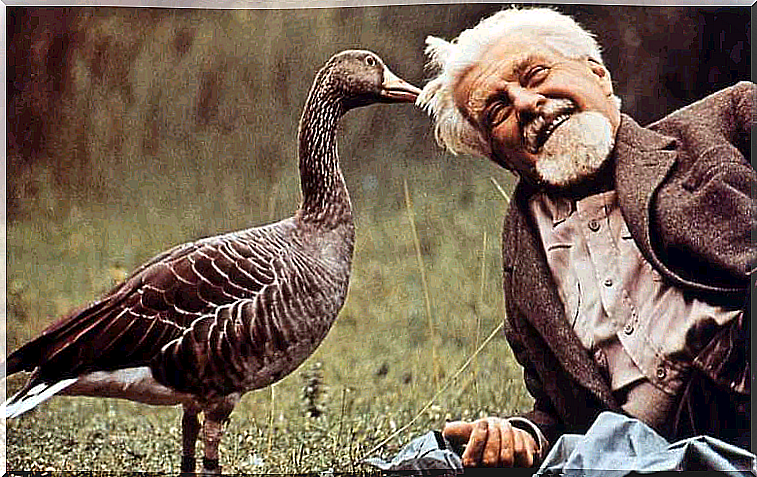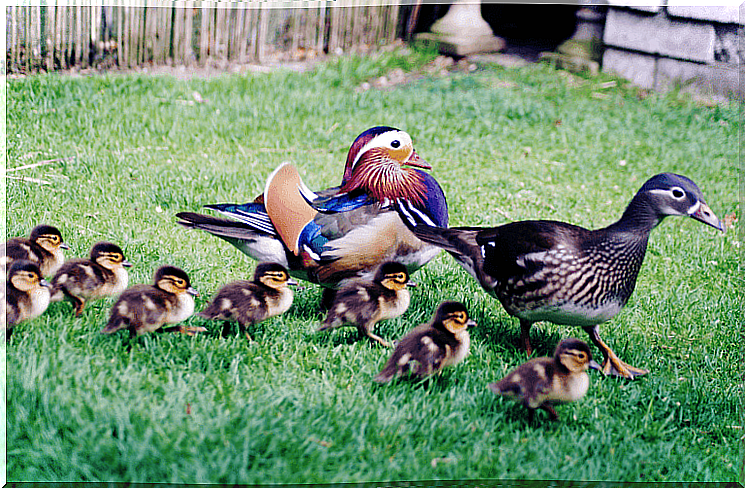Konrad Lorenz, A Legacy To Awaken To Life

Konrad Lorenz was, without a doubt, one of the most important scientists and researchers of the 20th century. He studied, practically like no other, animal behavior. He is known as the “father of ethology”, which is precisely the discipline that studies animal behavior. His research has remarkably enriched what we knew about the laws of adaptation and survival.
This remarkable scientist was born in Vienna in 1903. From a very young age, he showed a special love for animals . He had numerous pets and devoted a good part of his time to caring for them with care. Curiously, he had a great attraction for wild geese and from that fascination his first discoveries were born. For all this, he always wanted to study zoology, but his father expected him to be a doctor and Konrad did not want to upset him.
This is how Konrad Lorenz ended up studying medicine at Columbia University in New York. However, as soon as he graduated, he continued his research in zoology. This led him to complete doctoral studies in that discipline at the University of Vienna.
Konrad Lorenz and ethology
Konrad Lorenz was a great observer. He spent much of his time watching what wild geese and other birds were doing. In 1936 he met Niko Tinbergen, a biologist and ornithologist. They both shared the same fascination for animals, so they started working together. Between the two they laid the foundations of what would later become ethology, a science that studies animal behavior.

Ethology is a purely biological science, but it is closely related to psychology. This, because it also studies the bases of behavior. What is found in animals is contrasted with human behavior and vice versa.
One of the most relevant aspects of Konrad Lorenz’s studies was that he designed, with the help of his teacher, Oskar Heinroth , the concept of “fixed patterns of behavior”. As the name implies, it is a series of invariable behavior patterns, which they found in a good part of the animal species.
He discovered that there were instinctive responses, which were marked by genetic programming. Faced with certain stimuli, these behaviors were set in motion, many of which included real rituals. This is the case of the mating rituals of birds.
The imprint, an interesting concept
Another of the most important concepts developed by Konrad Lorenz is that of the imprint. It is a kind of mark or footprint that is fixed in some animals from the moment they are born. Lorenz discovered this by observing newborn goose and duck pups.
He detected that the chicks hatched and followed the first moving object they saw. They did not notice if that object was their mother or not. They just acted automatically, chasing whatever moved in front of them. He called that behavior an imprint.
Konrad Lorenz also noted that this matter was not limited to the first few minutes of life, but was maintained over time. Reaching such a point that imprinted animals could attempt to mate with human beings upon reaching maturity. They even reject members of the same species, giving priority to humans. This does not occur in all animal species, but it does in several.

A great legacy
Konrad Lorenz’s studies had great impacts on psychology. One of the most important was to have shown that instinct plays a very important role in all animals, including humans. This contradicted some behaviorist theses, in which it was postulated that all human behaviors were learned.
In the same way, the concept of “imprint” has made it possible to define new points of view regarding the impact that circumstances have on behavior. It clearly demonstrated that under certain conditions, even instinct is capable of leading us down unsuspected paths thanks to its springs.
Konrad Lorenz’s research, globally, provided valuable elements to understand the laws of adaptation and survival in the animal kingdom, which can be extrapolated to humans. In this way, he won the Nobel Prize in Medicine in 1973 and became responsible for the creation of a new discipline: ethology. His mark is alive in current knowledge and his name already has an indisputable place among the greats of history.









